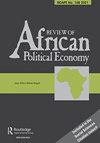20世纪60年代和70年代初苏联在非洲的情报收集:一篇评论文章
IF 1.4
3区 社会学
Q1 AREA STUDIES
引用次数: 0
摘要
本文章由计算机程序翻译,如有差异,请以英文原文为准。
Soviet intelligence gathering in Africa in the 1960s and early 1970s: a review article
ABSTRACT The wave of independence in Africa in the late 1950s and early 1960s, combined with the ‘thaw’ after Khrushchev’s denunciation of Stalin at the 20th Congress of the Communist Party of the Soviet Union, resulted in renewed Soviet interest after two decades of ignoring African affairs. Newly established diplomatic relations with liberation movements and independent states required the rapid training of middle-level cadres who could report back accurately to Moscow, as the USSR struggled to limit US and European influence in Africa. A volume in Russian of over 400 documents from the 1960s and early 1970s excludes the Arabic-speaking north, but allows readers to understand how intelligence was gathered on the ground by Soviet functionaries attempting to interpret local politics for power centres at home. This review article focuses on the political context in which African expertise was acquired, and analyses three cases from the volume – Ghana, Congo-Léopoldville in crisis, and Namibia in the early struggle for liberation.
求助全文
通过发布文献求助,成功后即可免费获取论文全文。
去求助
来源期刊

Review of African Political Economy
Multiple-
CiteScore
3.00
自引率
7.70%
发文量
29
期刊介绍:
The Review of African Political Economy (ROAPE) is a refereed journal committed to encouraging high quality research and fostering excellence in the understanding of African political economy. Published quarterly by Routledge, Taylor & Francis Group for the ROAPE international collective it has since 1974 provided radical analysis of trends and issues in Africa. It has paid particular attention to the political economy of inequality, exploitation and oppression, whether driven by global forces or local ones (such as class, race, community and gender), and to materialist interpretations of change in Africa. It has sustained a critical analysis of the nature of power and the state in Africa.
 求助内容:
求助内容: 应助结果提醒方式:
应助结果提醒方式:


